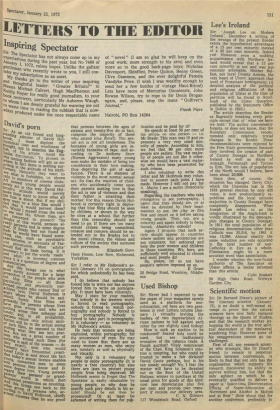Lee's Ireland
Sir 'Joseph Lee on Modern Ireland*, December 4, writing of the wrongs of the present Border extols the hypothetical advantages of a 15 per cent minority instead of a 35 per cent minority. Indeed yes! However even a nodding acquaintance with Northern Ireland would reveal that a 15 per cent minority is not and was not remotely attainable. Neither Belfast, nor loyal County Antrim, the very heart of Ulster, approach that level of Protestant homogeneity, (A detailed analysis of the political and religious affiliations of the population of Ulster at the time of partition will be found in Handbook of the Ulster Question, published by the Stationery Office in Dublin in 1923.)
The article describes the Border as flagrantly breaking every principle except that of ' what we have we hold.' The author conveniently forgets, or does not know, that the Boundary Commission recommended only relatively trivial changes in the Border. These recommendations were rejected by the Free State government because they involved the cession of part of County Donegal to Northern Ireland as well as slices of Armagh, Fermanagh and Tyrone to Eire. The net loss of population of the North would I believe, have been about 25,000.
Since then, of course, the situation has changed. Derry City, which the Unionists lost in the 1918 general election by only 435 votes, is now predominantly republican and the local unionist majorities in County Donegal have completely disappeared. What Joseph Lee refers to as the integration of the Anglo-Irish is vividly illustrated by the demographic changes in County Donegal. In 1911 the total population of all religious denominations other than Catholic was 35,516, by 1961 it was 15,590. Almost exactly the same reduction pro rata occurred in the total number of nonCatholics in Eire as a whole. Elimination might be a more accurate word than assimilation.
I wonder whether the new-found authority of The Spectator on Ulster affairs is better informed than this article.
Co/in Baskett 30 High Oaks Road, Welwyn Garden City










































 Previous page
Previous page